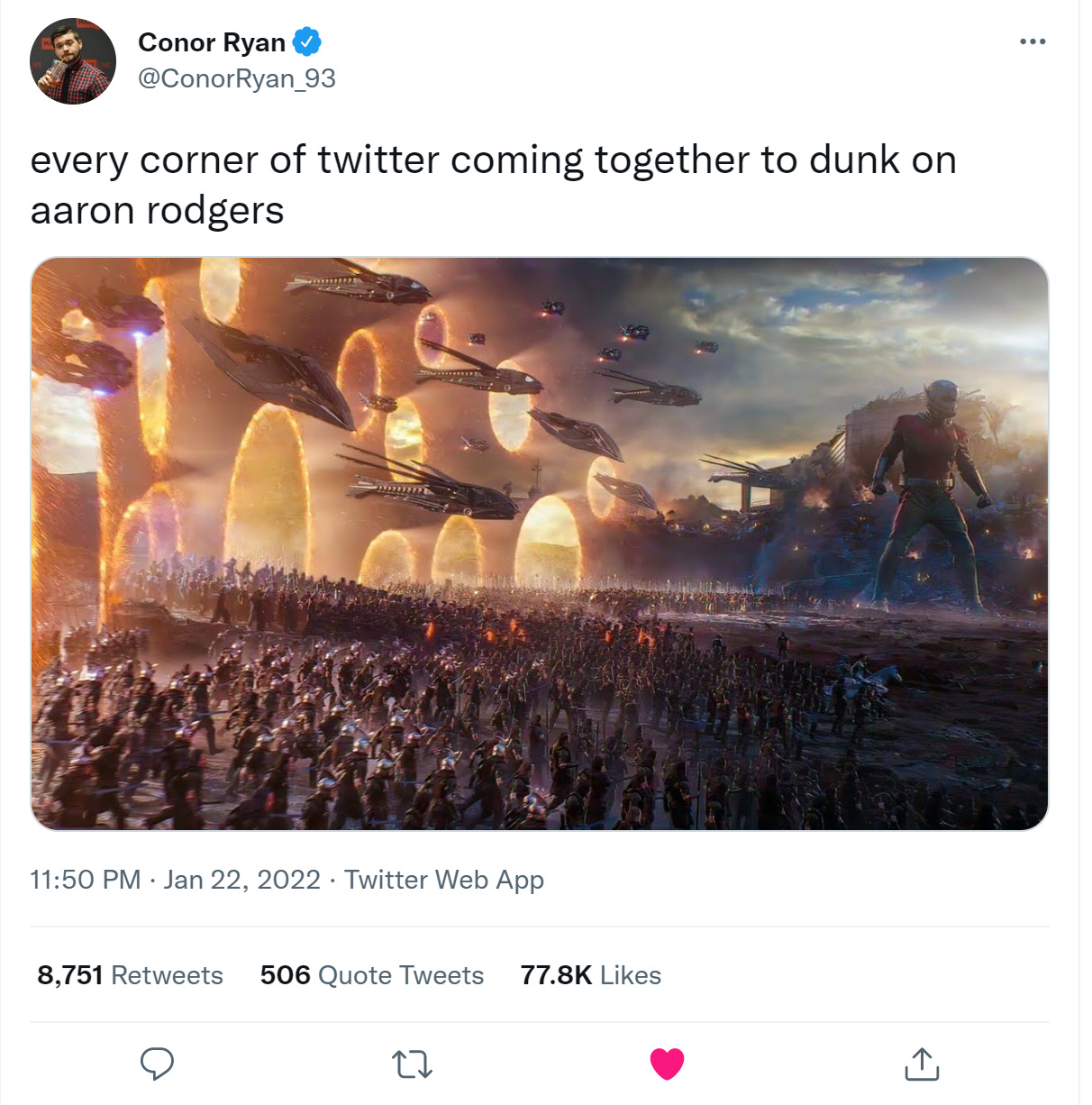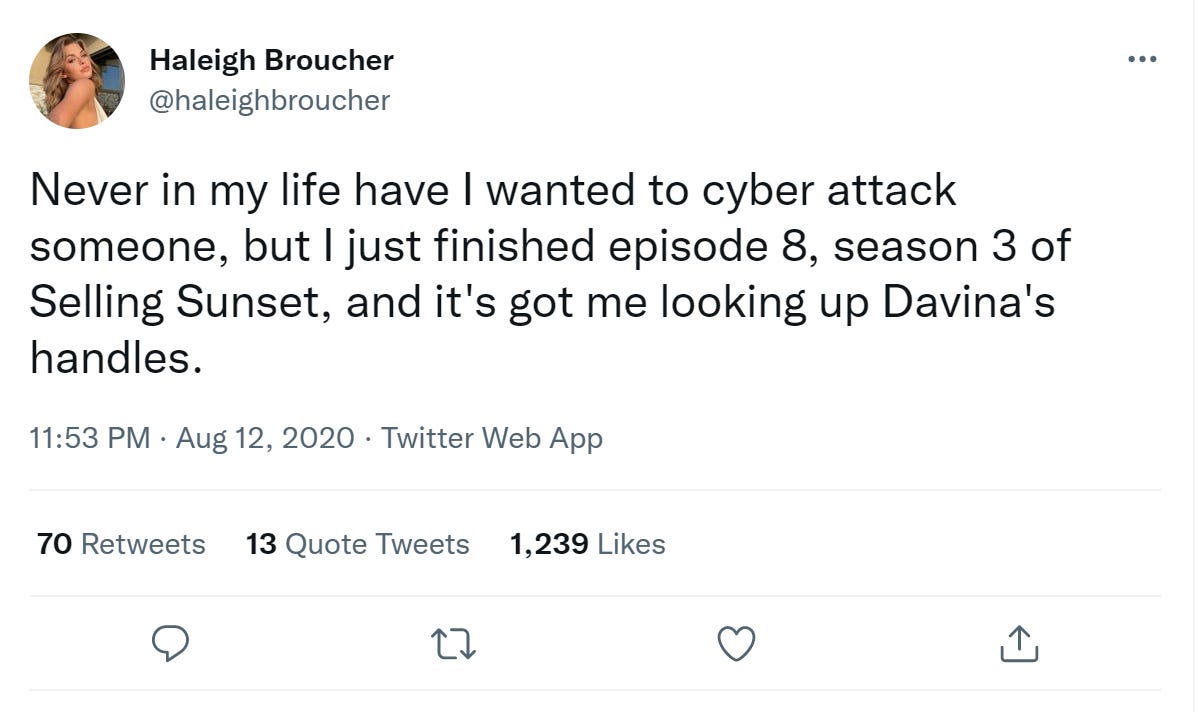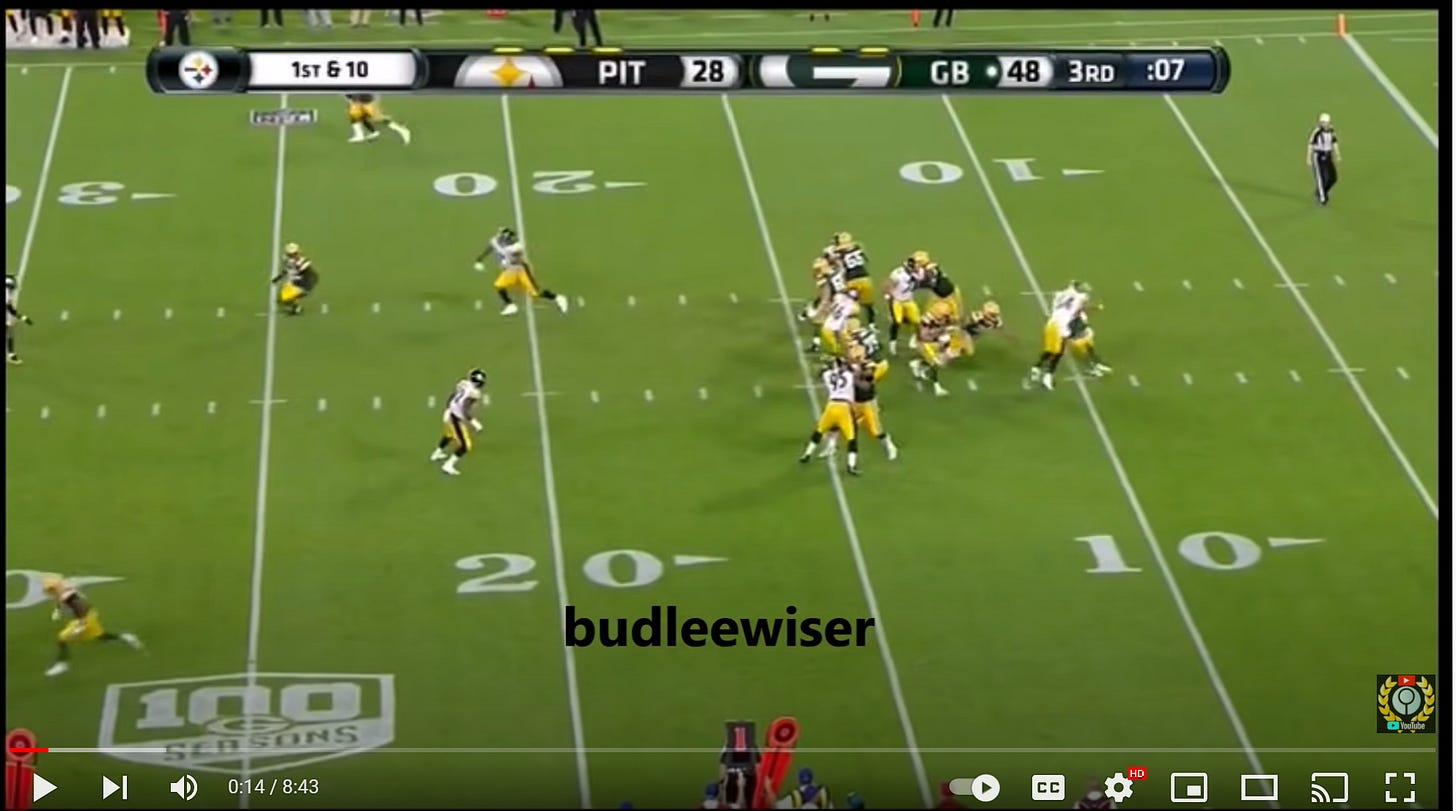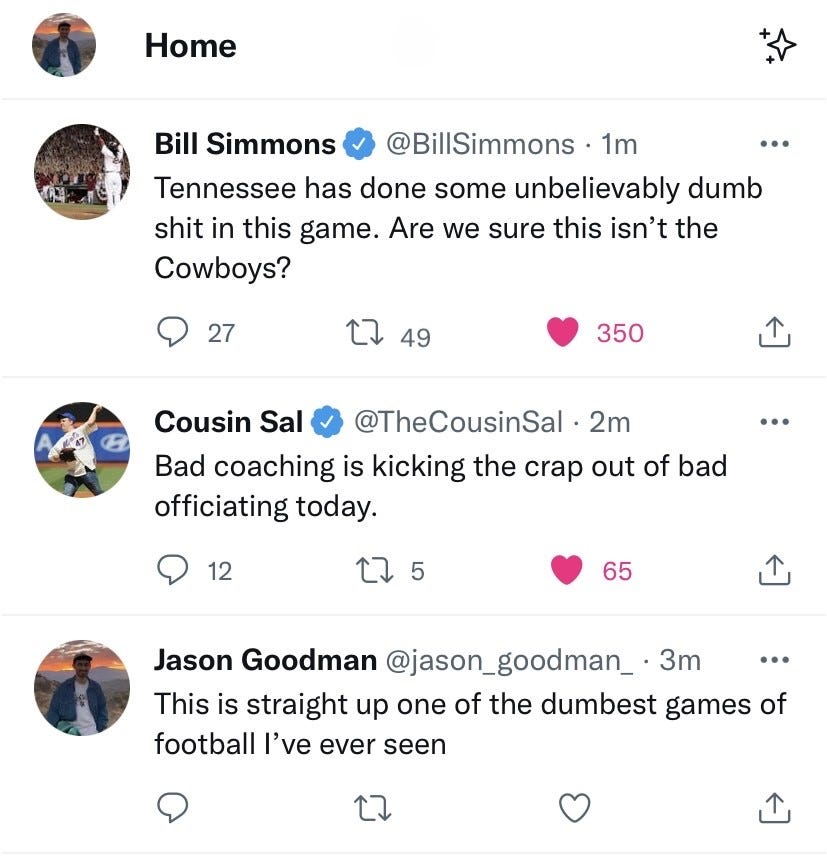Football, Reality Television, and The Nature of Popular Content
Aaron Rodgers and Davina Potratz might have more in common than you think
I live with four girls who do not like sports so I usually watch meaningless games alone in my room. Occasionally, my TV stops working and I’ll venture upstairs to watch. Thankfully, even though they aren’t fans, they don’t mind watching a game. They usually crochet and chat while I pace anxiously. They chime in when something looks cool or they see a recognizable face. And sometimes they even ask questions to clarify the action (or more often than not, I’ll answer questions that weren't asked). So when I had to watch the NFC and AFC Divisional games in our living room, they were more than willing to passively watch. However, when I turned the 49ers-Packers game on that Saturday night, I never expected what I would unleash. What followed was one of the greatest football weekends in recent memory. Every game was decided on the last possession in dramatic fashion. But what was perhaps even more shocking than the action on the screen was the action in my living room.
My four football-ignorant housemates became invested in the games. What started as passive viewing Saturday night turned into passionate engagement less than 24 hours later. Specifically, my roommate Alexis- the last one up for the final 2 minutes of the Bills-Chiefs game- became a bonafide fan that night. And it’s continued since then. She is genuinely excited about the games and invested in the players.
This shocking development left me here… How did it happen? How did a slate of football games convince my roommates that football is awesome and worth their time.
The best place to start is to ask the much broader cultural question- How do things become popular? Or rather, how do things become so popular that they become relevant beyond their niche audience? For that, we need to look elsewhere. In the siphoned pop cultural wasteland we’re stuck in, we need to compare football to one of the only cultural objects that seems to generate palpable conversation- Reality Television.
So stick with me here, as I try to make the case that NFL Football and reality TV are more alike than we think, as they rely on the same tactics to firmly assert themselves as centerpieces of popular culture.
Memorable Characters
Aaron Rodgers has been a quarterback in the NFL for 17 seasons. He has been the MVP of the league 3 times, won a Super Bowl, and is considered one of the most talented quarterbacks of all time. Yet, he has never been more culturally relevant than during this season. And it’s not because he was really good (he was). It’s because he transformed into a villain. To briefly summarize, it was discovered in the middle of the season that Aaron Rodger’s COVID “immunization” was a gummy vitamin and some essential oils and NOT in fact, an actual COVID-19 vaccine. He lied to the NFL and the media for weeks. He apologized and then unapologized and then consulted Joe Rogan and then gave us all a free foot pic showing us his “covid toe.”
His insane behavior generated a conversation that tarnished and cemented his image beyond the field. He capped off his slow crawl into villainy during a recent interview where he validated insurrectionists and suggested Joe Biden did not legitimately win the 2020 election. So naturally, when he lost his at-home divisional game to Jimmy Garoppolo, every person on twitter engaged in collective celebration. So much so that he claims he was the subject of undue vitriol because of his vaccination status (yea, and?). Aaron Rodgers became a player whose intrigue extended beyond his “football” persona. His character development and storyline allowed people who didn’t care about his QBR to become deeply invested in whether he won or lost.
Rodgers isn’t so different than another TV villain- Davina Potratz from Selling Sunset.
A brief disclaimer: I know that Davina is not as famous or relevant as Aaron Rodgers and I know that Selling Sunset is not as popular as the NFL.
However, Davina is a character on TV who has inspired deep hatred. She has all the villainy of the Aaron Rodgers story with a real estate spin. Most notably, Davina attempted (and hilariously failed) to sell a house she listed for $80 million. While audiences laughed at her and her unsold mansion, they raged in her absolutely nutso behavior towards the main character, Chrishell, in the finale of Season 3. *Spoilers Ahead* Davina questioned Chrishell’s side of the story after she was dumped and humiliated by her husband. After doing so, Davina became the most hated person on the internet.
Countless tweets and tiktoks questioned her humanity after her incomprehensibly horrible behavior. In a way, her character arc became the subject of a furied cultural conversation that spanned beyond that purview of the show. Like Rodgers did for football, Davina’s evil character and absurd storyline created fans of Selling Sunset who actively do not care what she sells (or fails to sell) on Sunset Boulevard.
In essence, football and reality TV become super popular when the content itself becomes irrelevant to the stories that it creates. Football and reality shows succeed at doing so because they don’t need “good” football or “real” reality to be popular. Sure, those characteristics are the baseline to the content they produce but each medium achieves outsized cultural relevance when they birth memorable characters and storylines on top of it. When producers are successful at that, they open up their potential audience to anyone interested in crazy people- a subset of the population far greater than those interested in dudes throwing balls or rich people selling houses.
Clear Storylines
Even though the characters and their arcs can sometimes be twisted, windy and complicated, the storylines they create are profoundly digestible to the passive viewer. Rather, the visual language of both football and reality television is legible to those watching. Anyone sitting on the couch or walking by the TV who has no interest or knowledge in football can tell when something great or terrible happens. A 55 yard touchdown and a 15 yard sack look like the successes and failures that they are.
While football is violent and visceral, other sports are a bit more challenging to parse. Basketball is like jazz- players quickly pass the ball, up and down the court, with big plays coming at surprising and unexpected moments. And while baseball operates through suspenseful and thrilling moments, the players at the center of those moments have been muted by the MLB. Football is the only sport that combines compelling characters with visually legible storylines, allowing fans and passive viewers to both be invested in what’s happening on screen.
Likewise, reality television operates through simplistic narrative structures that its wild characters can operate within. Rich women selling expensive houses- Selling Sunset. Rich women living in expensive houses- Real Housewives Franchise. A bunch of people from various walks of life live in an apartment together- The Real World. Crew members work and live on a yacht- Below Deck. You get the point. Easy conceit, crazy characters and a world where simple storylines become compelling to anyone who turns them on. And beyond their conceit, the visual language of reality TV storytelling is understandable to anyone who understands human emotions. Directors, editors and producers do a great job of letting the audience know how they should react. Music, editing, pacing and BIG emotions all clue us in on what we should be feeling as an audience, even if we have no idea what is going on with the characters.
So far, we have a formula…
Insane Characters + Digestible and Visually Legible Storytelling = popular content
However, I’d posit there’s something else. One more variable that makes people all around America susceptible fans to both football and reality television. One almost ineffable characteristic that is the core of their shared DNA.
They are Profoundly Dumb
Both reality TV and the NFL are fundamentally dumb. Their DNA is defined by stupidity because their structure allows ample opportunity for dumb decision making. In reality shows, characters are incentivized to make the dumb choice. In football, it just happens.
The best way to illustrate the baffling stupidity of the NFL is through the Bengals-Titans AFC Divisional game.
1st Quarter:
DUMB PLAY: Ryan Tannehill is intercepted on the first play of the game (hilarious and dumb)
Cincinnati is up 6-0 after making two field goals
2nd Quarter:
Tennessee scores a touchdown but fails on a 2 point conversion
DUMB COACHING DECISION ALERT: There is no reason to go for a 2 point conversion at this point in the game. It doesn’t give you any sort of possession advantage, aka 8-6 means the same thing as 7-6 this early in the game. Because they failed though, it ends up a tie game when it didn’t need to be.
3rd Quarter:
DUMP PLAY CALL ALERT: After the Titans Offense rushes for 66 yards in 4 plays and reaches the Bengals 20 yard line, Ryan Tannehill throws a pass that is tipped and intercepted
DUMB REF MOMENT: Joe Burrow’s passed is tipped, grazes the ground and is picked up by Amani Hooker. Whether or not this was the right or wrong call, it was still really dumb and fun to see play out
4th Quarter
16-16 and Titans have successfully stopped the Bengals.
DUMP COACHING DECISION: After D’Onta Foreman rushes the ball for 19 yards and Tannehill passes to Jones and Brown for 30 yards, the Titans find themselves in a 3rd and 1 on the Bengals 35 yard line. The next two play calls are a Tannehill QB rush from the backfield and then a handoff to Derrick Henry in the backfield on 4th and 1 resulting in a loss of yards and a turnover on downs.
DUMB PLAY: There are 28 seconds left and it is a tie game. Titans have the ball on a 3rd and 5. Tannehill passes into traffic, the ball is tipped and the Bengals intercept him for the 3rd time and receive the ball on the 50 yard line with 20 seconds to go.
Cincinnati goes 19 yards in 16 seconds. Evan McPherson kicks a 52 yard Field Goal and they win the game.
DUMB STAT: The Titans sacked Joe Burrow a record 9 times and still lost the game
Now let’s pivot to the world of reality television where equally dumb things happen at just as high of a frequency. To name a few (links provided)…
Selling Sunset Season 4- Mary sobs because her ex-best friend and current enemy shows up to her dog’s birthday party.
Bachelor Season 24 Episode 2- Kelsey saves a bottle of champagne to open with the Bachelor, Peter. Another contestant, Hannah Ann opens it with him. Kelsey then screams and cries and gets another bottle of champagne. When she opens it, it explodes in her face.
Love is Blind Season 1- In the middle of a fight between failed couple Jessica and Mark, Jessica lets her dog drink out of her wine glass in between sips (Submission by friend of the stack, Vanessa Ishimwe).
Real Housewives of Beverly Hills- Lisa opens up about the death of her sister and then Kim freaks out and calls another lady a beast (submission by Sam Goodman)
Survivor, Season 7- Johnny Fairplay fakes his grandmother’s death to gain sympathy and win the reward challenge (submission by Alex Chanen)
These scenes, plays, calls, and moments have been etched into popular memory. We not only remember them because they are shocking, but they are also a result of unbelievable idiocy. Whether it’s Mike Vrabel going for a 2 point conversion or Jessica letting her dog drink out of her wine glass, these moments make viewers question the intelligence of the characters they are watching on screen. Moreover, these innate reactions to on-screen stupidity create communal experiences for the audience, where enjoyment can extend beyond the typical fan base. While someone who doesn’t watch football or reality TV may not get the nuances of the unbelievable decisions they are seeing on screen, it’s really easy to viscerally scream “WHY” or “HOW” at the TV, and react to those decisions in real time. And while all art features characters making dumb decisions, the structure and simplicity of football and reality TV make it really easy to decipher which decisions are ridiculous and how to react to them in real time with little context otherwise.
Here’s what I think I mean by all of this: football and reality television are some of the few pieces of content that are consistently watched at high levels. To do so, both appeal to audiences beyond the die-hard fan or longtime viewer. Both are able to do so because they feature memorable characters with easily identifiable and visually coherent storylines that often veer into stupidity and absurdity. The natural tendency for both of these mediums to imbue unbelievable dumbness into every aspect of their existence makes them all the more consumable. Characters, storylines, and stupidity combined allow football and reality TV shows to engage dedicated fans and reel in passive viewers better than any other sport or television show.
Or this…
dumb x (Insane Characters + Digestible and Visually Legible Storytelling) = popular content
Some Final Thoughts…
All art and content has its niche audience. Plenty of people are fans of Yellowstone or Top Chef or professional hockey, for that matter. But having fans is far different than existing in some sort of mainstream cultural discourse. For that to happen, the content needs to have a full spectrum of engaged viewers. There will be people that know about it and don’t watch, watch a little and care a little, and watch a lot and care a lot. It is hard to be as dominant as football and reality TV. They have been facets of American popular culture for decades and have fluctuated in their popularity. But in 2022, both are at the center of culture because both have adapted to a changing viewership and changing viewing landscape. The decision makers at the NFL and producers of the best reality television have learned that to make noise in a saturated cultural environment where everyone has a microphone, they need characters and storylines that will get everyone talking.










loved this article! almost made me want to watch a little football, but I think I'll stick to selling tampa